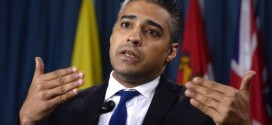
Canada to vote on air strikes in Iraq
Canadian Prime Minister Stephen Harper on Friday announced that Canadian fighter jets will participate in the battle against Islamic State (IS) militants in Iraq for six months.
Harper told the Canadian parliament to send air-to-air refueling airplanes as well as two surveillance airplanes to the region. Harper, however, did not mention how many jets will take part in the campaign, but said that Canada will not deploy foot soldiers in Iraq to combat the IS. The plan will be put to vote next Monday and will likely be approved since the ruling party has a majority.
“We intend to significantly degrade the capabilities of ISIL, specifically, its ability either to engage in military movements of scale or to operate bases in the open”, Harper said.
However, the main opposition parties have said that they will vote against the plan since Harper had not given out enough details of the plan.
The US has been launching air strikes on the IS in Syria for the past two weeks and in Iraq since August. Other European nations have since joined the aerial campaign in Iraq but not in neighbor Syria.
Earlier in the day, Australia had said that it will contribute fighter jets to the US-led campaign.
“The government is seized with the necessity of avoiding a prolonged quagmire in this part of the world”, Harper said, adding that Canada might end the mission quickly.
Harper also said that Canadian fighter planes will not launch strikes in Syria unless it has the Syrian regime’s approval.
In 2003, the Canadian government back then had refused to get involved in the US invasion of Iraq. Harper, who was then the leader of the opposition, had backed the campaign.
Leader of the New Democrats, the official opposition party in Canada, Thomas Mulcair, said, “Canada for our part should not rush into this war”. Liberal Party leader Justin Trudeau also tended to agree with Mulcair, saying that it was a lot easier to enter the war that to leave it, and that his legislators will vote against the deployment.
 The Arab Democrat The Latest From The Arab World
The Arab Democrat The Latest From The Arab World





